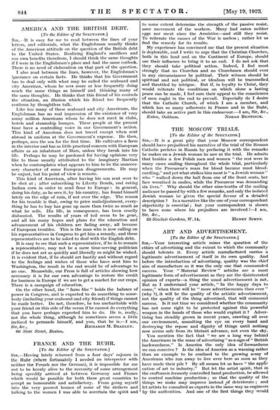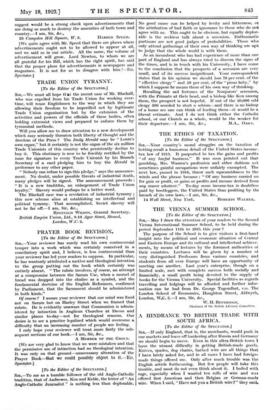ART AND ADVERTISEMENT.
[To the Editor of the SPECTATOR.]
Sia,—Your interesting article raises the question of the ethics of advertising and the extent to which the community should tolerate it. Every article manufactured carries a legitimate advertisement of itself in its own quality. And before the introduction of advertising, quality was the chief aim of manufacture as it was the only one that commanded success. Your " Material Review " articles arc a most legitimate form of advertisement as they are the disinterested opinion of experts—a thing the usual advertisement is not. But as I understand your article, " In the happy days to come," when there will be " more advertisements than ever " (why ?), it will be the quality of the artistic advertisement, not the quality of the thing advertised, that will command success. Is it not time we considered whether the community has not some right to be protected against this powerful weapon in the hands of those who would exploit it ? Adver- tising has steadily grown in recent years, crawling all over our environment, assaulting the eye on every hand and destroying the repose and dignity of things until nothing now seems safe from its blatant advance, not even the sky.
You mention the fact that " we are a long way behind the Americans in the mass of advertising " as a sign of " British backwardness." Is America the only idea of forwardness we can conceive ? Is the idea of America as a warning rather than an example to be confined to the growing army of Americans who run away to live over here as soon as they have made their pile ? By all means let us have " the appli4 cation of art to industry." But let the artist spirit, that in the craftsmen formerly controlled hand production, be allowed to control machine production ; so that the quality of the things -we niake may improve instead of deteriorate ; and let artists be consulted as experts in the same way as engineers by the authorities. And one of the first things they 'would
suggest would be a strong check upon advertisements that are doing so much to destroy the amenities of both town and country.—I am, Sir, &c., 23 Campden Hill Square, W. 8. HAROLD SPEED.
[We quite agree with Mr. Speed that there are places where advertisements ought not to be allowed to appear at all, and we said so in our article. All the same, the volume of advertisement will grow. Lord Newton, to whom we are all grateful for his Bill, which has the right spirit, has said that the proper place for advertisements is newspapers and magazines. It is not for us to disagree with him I—ED. Spectator.]











































 Previous page
Previous page